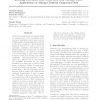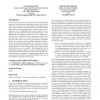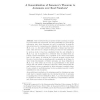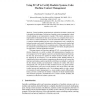115 search results - page 23 / 23 » Representing First-Order Causal Theories by Logic Programs |
ICML
2004
IEEE
14 years 5 months ago
2004
IEEE
Inductive learning of first-order theory based on examples has serious bottleneck in the enormous hypothesis search space needed, making existing learning approaches perform poorl...
EMSOFT
2004
Springer
13 years 10 months ago
2004
Springer
Embedded devices like smart cards can now run multiple interacting applications. A particular challenge in this domain is to dynamically integrate diverse security policies. In th...
ATAL
2010
Springer
13 years 5 months ago
2010
Springer
Social laws have proved to be a powerful and theoretically elegant framework for coordination in multi-agent systems. Most existing models of social laws assume that a designer is...
CADE
2009
Springer
14 years 5 months ago
2009
Springer
Abstract This work studies the properties of finite automata recognizing vectors with real components, encoded positionally in a given integer numeration base. Such automata are us...
TPHOL
2007
IEEE
13 years 11 months ago
2007
IEEE
Formal, modular, and mechanized verification of realistic systems code is desirable but challenging. Verification of machine context management (a basis of multi-tasking) is one ...




